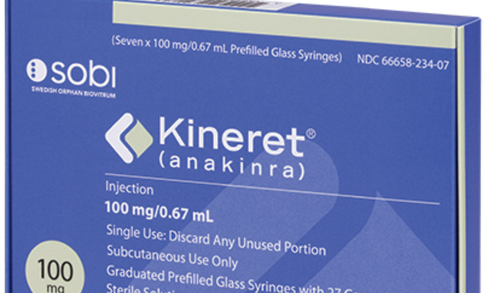
Young blood plasma transfusions for anti-aging are popular with some wealthy elites. There are claims that young blood rejuvenates the body's organs. But turning back the body's clock with transfusions might not need to be done anymore following research from Columbia University in New York that states an anti-inflammatory drug can rejuvenate the body and possibly increase the human lifespan by decades.
"An aging blood system, because it's a vector for a lot of proteins, cytokines, and cells, has a lot of bad consequences for the organism," Emmanuelle Passegué, Ph.D., director of the Columbia Stem Cell Initiative, who's been studying how blood changes with age, said in a statement.
"A 70-year-old with a 40-year-old blood system could have a longer healthspan, if not a longer lifespan," Passegué said.
Instead of a liter of plasma from younger donors that might cost thousands of dollars, researchers found young blood could be produced in pill form.
That pill is an anti-inflammatory drug called anakinra, already approved for use in rheumatoid arthritis. Passegué and graduate student Carl Mitchell discovered anakinra reverses some of the effects of age on the hematopoietic system of mice.
"These results indicate that such strategies hold promise for maintaining healthier blood production in the elderly," Mitchell said.
What didn't work, and explained by Passegué and her team in a 2021 study in the Journal of Experimental Medicine, was:
to rejuvenate old hematopoietic stem cells, in mice, with exercise or calorie-restricting diet, both generally thought to slow the aging process. Neither worked. Transplanting old stem cells into young bone marrow also failed. Even young blood had no effect on rejuvenating old blood stem cells.
Her team then discovered the benefits of anakinra in mice:
Mitchell and Passegué then took a closer look at the stem cells' environment, the bone marrow. "Blood stem cells live in a niche; we thought what happens in this specialized local environment could be a big part of the problem," Mitchell says
With techniques developed in the Passegué lab that enable detailed investigation of the bone marrow milieu, the researchers found that the aging niche is deteriorating and overwhelmed with inflammation, leading to dysfunction in the blood stem cells.
One inflammatory signal released from the damaged bone marrow niche, IL-1B, was critical in driving these aging features, and blocking it with the drug, anakinra, remarkably returned the blood stem cells to a younger, healthier state.
Even more youthful effects on both the niche and the blood system occurred when IL-1B was prevented from exerting its inflammatory effects throughout the animal's life.
The researchers are now trying to learn if the same processes are active in humans and if rejuvenating the stem cell niche earlier in life, in middle age, would be a more effective strategy.
Meanwhile, "treating elderly patients with anti-inflammatory drugs blocking IL-1B function should help with maintaining healthier blood production," Passegué says, and she hopes the finding will lead to clinical testing.
"We know that bone tissue begins to degrade when people are in their 50s. What happens in middle age? Why does the niche fail first?" Passegué says. "Only by having a deep molecular understanding will it be possible to identify approaches that can truly delay aging."
Of course, the research is still very early, and results have yet to be tested on humans. But that might not stop people from Googling the drug as a possible anti-aging solution.
Young blood plasma transfusions for anti-aging are popular with some wealthy elites. There are claims that young blood rejuvenates the body’s organs. But turning back the body’s clock with transfusions might not need to be done anymore following research from Columbia University in New York that states an anti-inflammatory drug can rejuvenate the body and possibly increase the human lifespan by decades.
“An aging blood system, because it’s a vector for a lot of proteins, cytokines, and cells, has a lot of bad consequences for the organism,” Emmanuelle Passegué, Ph.D., director of the Columbia Stem Cell Initiative, who’s been studying how blood changes with age, said in a statement.
“A 70-year-old with a 40-year-old blood system could have a longer healthspan, if not a longer lifespan,” Passegué said.
Instead of a liter of plasma from younger donors that might cost thousands of dollars, researchers found young blood could be produced in pill form.
That pill is an anti-inflammatory drug called anakinra, already approved for use in rheumatoid arthritis. Passegué and graduate student Carl Mitchell discovered anakinra reverses some of the effects of age on the hematopoietic system of mice.
“These results indicate that such strategies hold promise for maintaining healthier blood production in the elderly,” Mitchell said.
What didn’t work, and explained by Passegué and her team in a 2021 study in the Journal of Experimental Medicine, was:
to rejuvenate old hematopoietic stem cells, in mice, with exercise or calorie-restricting diet, both generally thought to slow the aging process. Neither worked. Transplanting old stem cells into young bone marrow also failed. Even young blood had no effect on rejuvenating old blood stem cells.
Her team then discovered the benefits of anakinra in mice:
Mitchell and Passegué then took a closer look at the stem cells’ environment, the bone marrow. “Blood stem cells live in a niche; we thought what happens in this specialized local environment could be a big part of the problem,” Mitchell says
With techniques developed in the Passegué lab that enable detailed investigation of the bone marrow milieu, the researchers found that the aging niche is deteriorating and overwhelmed with inflammation, leading to dysfunction in the blood stem cells.
One inflammatory signal released from the damaged bone marrow niche, IL-1B, was critical in driving these aging features, and blocking it with the drug, anakinra, remarkably returned the blood stem cells to a younger, healthier state.
Even more youthful effects on both the niche and the blood system occurred when IL-1B was prevented from exerting its inflammatory effects throughout the animal’s life.
The researchers are now trying to learn if the same processes are active in humans and if rejuvenating the stem cell niche earlier in life, in middle age, would be a more effective strategy.
Meanwhile, “treating elderly patients with anti-inflammatory drugs blocking IL-1B function should help with maintaining healthier blood production,” Passegué says, and she hopes the finding will lead to clinical testing.
“We know that bone tissue begins to degrade when people are in their 50s. What happens in middle age? Why does the niche fail first?” Passegué says. “Only by having a deep molecular understanding will it be possible to identify approaches that can truly delay aging.”
Of course, the research is still very early, and results have yet to be tested on humans. But that might not stop people from Googling the drug as a possible anti-aging solution.
Loading…







